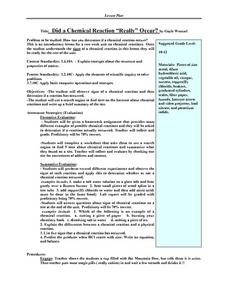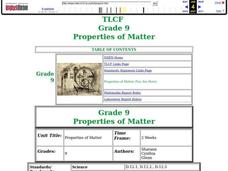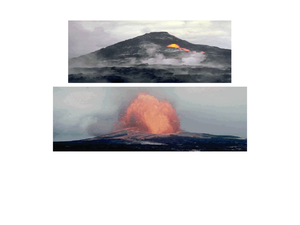Curated OER
Breaking it Down
High schoolers will identify the factors that contribute to erosion and weathering. They will start by differentiating between chemical and mechanical weathering. They then apply what they learned by playing the online jeopardy game. Key...
Curated OER
Controlling Chemical Reactions
Students study chemical reactions and how to speed up or slow down one. In this experimental lesson plan students participate in an activity that allows them to observe chemical reactions.
Curated OER
Sometimes, solid + liquid = gas
Third graders experiment with common household liquids and solids. In this chemical reaction lesson, 3rd graders discuss phase changes and experiment to find other ways to create gases. They use water, vinegar, lemon juice, flour, baking...
Curated OER
Reading the River
In collaborative groups, young ecologists measure the temperature, pH, and dissolved oxygen for three different freshwater samples. They examine each sample with a microscope and record observations on the microorganisms in the pond...
Curated OER
Chemical Changes
Eighth graders observe two types of interactions in a sealed plastic bag. One bag contains baking soda and water, and the other baking soda and vinegar. They determine what evidence indicates that a chemical change is occurring.
Curated OER
Ice Cream Chemical and Physical Changes
Fourth graders identify characteristics of a simple physical and chemical change. They describe objects by the properties of the materials from which they are made and that these properties can be used separate. Students describe the...
Curated OER
Science Investigation Using Water Quality
Eighth graders conduct an experiment that analyzes the physical and chemical characteristics of various water samples. They discuss the procedures and safety concerns for the water test, and test their water samples to determine if they...
Curated OER
Did a Chemical Reaction "Really" Occur?
Students perform several different experiments to observe signs of chemical reactions and determine if reaction has occurred, use search engine to find Internet sites pertaining to chemical reactions, and write up brief summary of site.
Curated OER
How Can we Measure the Rate of a Chemical Reaction?
High schoolers examine different types of chemical reactions. They explore how alcohol molecules affect the reaction rates. They answer discussion questions to end the lesson.
Curated OER
Properties of Matter
Ninth graders explore the molecular structure of matter and how it can affect the physical characteristics of a specific material. They demonstrate that isotopes of an element have different masses. Students demonstrate that the rates of...
American Chemical Society
Forming a Precipitate
Things are getting a little slippery in an inquiry-based lesson studying precipitates. Learners use soap and Alka-Seltzer tablets to create different mixtures with water. They then study the properties of the mixtures including their...
Curated OER
Confectionary Bureau of Investigations: Case of the Cookie Mystery
High schoolers perform tests on different chemicals to determine their chemical properties. In this forensic science lesson, students identify an unknown sample using its physical and chemical properties. They solve a fictional crime...
Space Awareness
Fizzy Balloons - C02 in School
Carbon dioxide is a very important gas; it is present in the air, used in cooking, and supports plant and animal life. Scholars investigate the properties of carbon dioxide with three different activities. They experience a color change,...
Teach Engineering
Density Column Lab - Part 1
Mass and density — aren't they the same thing? This activity has groups use balance beams and water displacement to measure several objects. The pupils use the measurements to calculate the density of the objects.
American Chemical Society
Mysterious M&M's
The first in a six-lesson plan mini unit, all using M&Ms® candies, this physical science activity gets kids to observe a single piece and discover what happens when it is placed in a plate of water. The activity can be used to...
American Chemical Society
From Gas to Liquid to Solid
From gas to liquid condensation to solid frost, water undergoes phase changes before young scholars' eyes! Using ice, salt, water, and a metal can, they set up an investigation that can be used in a physical science setting, or as part...
American Chemical Society
Evaporation
This is one in several lessons that explore the relationship between temperature and phase changes of water. After some discussion, elementary physical scientists place wet paper toweling on a hot and a room-temperature water bag and...
American Chemical Society
Solubility Test
Make sure to consult the teacher's handbook, Inquiry in Action - Investigating Matter Through Inquiry, for two demonstrations that can be done to introduce solubility and measuring crystal mass before having the class conduct this...
Curated OER
Chemical Engineering: Volcanoes
Students study volcanoes using a chemical engineering project. In this volcanoes lesson, students create a model town and discuss the properties of a volcano. Students then make a volcano using a chemical engineering format for their...
Curated OER
Be a Watershed - Create a Living River
Students investigate water ways by conducting an experiment with classmates. For this natural resources lesson, students define a watershed and identify where large ones are located within the United States. Students utilize cups,...
Curated OER
Water-holding Capacity of Earth Materials
Students design and conduct an experiment to test their ideas about how to speed up or slow down the rate of an enzyme-catalyzed reaction. They have access to an array of physical and chemical factors that might influence enzyme...
Curated OER
Ziplock Chemistry
Students investigate various chemical reactions when creating mixtures in ziplock baggies. In this chemistry lesson, students will recognize various chemical reactions and cite evidence. Safety and assessment strategies are included in...
Curated OER
Changes in Nature
Fifth graders identify the chemical and physical changes in the water cycle, carbon cycle, and the effects of weathering. They analyze the periodic table, and observe how vinegar reacts with limestone in a chemical reaction that causes...
Curated OER
Water Resource Engineering
Students examine solubility and the significance of water. In this aqueous solution lesson students complete a lab activity on soil profiles.

























